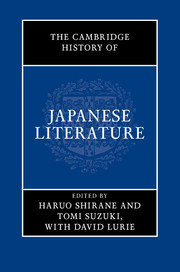Book contents
- The Cambridge History of Japanese Literature
- The Cambridge History of Japanese Literature
- Copyright page
- Contents
- Illustrations
- Contributors
- Book part
- A note on Romanization and conventions
- Glossary
- General introduction
- Part I The ancient period (beginnings to 794)
- Part II The Heian period (794–1185)
- 7 Introduction: court culture, women, and the rise of vernacular literature
- 8 Sugawara no Michizane, a Heian literatus and statesman
- 9 Kokinshūand Heian court poetry
- 10 Early Heian court tales
- 11 Genji monogatariand its reception
- 12 Late courtly romance
- 13 Premodern commentary on the classical literary canon
- 14 ThePillow Bookof Sei Shōnagon
- 15 Heian literary diaries: fromTosa nikkitoSarashina nikki
- 16 The Heian Academy: literati culture from Minamoto no Shitagō to Ōe no Masafusa
- 17 Heian canons of Chinese poetry:Wakan rōeishūand Bai Juyi
- 18 The Literary Essence of Our Court (Honchō monzui)
- 19 Vernacular histories:Eiga monogatari, Ōkagami, Gukanshō
- 20 Heian popular songs:imayōandRyōjin hishō
- Part III The medieval period (1185–1600)
- Part IV The Edo period (1600–1867)
- Part V The modern period (1868 to present)
- Bibliography of English secondary sources and translations
- Index
17 - Heian canons of Chinese poetry:Wakan rōeishūand Bai Juyi
from Part II - The Heian period (794–1185)
Published online by Cambridge University Press: 05 January 2016
- The Cambridge History of Japanese Literature
- The Cambridge History of Japanese Literature
- Copyright page
- Contents
- Illustrations
- Contributors
- Book part
- A note on Romanization and conventions
- Glossary
- General introduction
- Part I The ancient period (beginnings to 794)
- Part II The Heian period (794–1185)
- 7 Introduction: court culture, women, and the rise of vernacular literature
- 8 Sugawara no Michizane, a Heian literatus and statesman
- 9 Kokinshūand Heian court poetry
- 10 Early Heian court tales
- 11 Genji monogatariand its reception
- 12 Late courtly romance
- 13 Premodern commentary on the classical literary canon
- 14 ThePillow Bookof Sei Shōnagon
- 15 Heian literary diaries: fromTosa nikkitoSarashina nikki
- 16 The Heian Academy: literati culture from Minamoto no Shitagō to Ōe no Masafusa
- 17 Heian canons of Chinese poetry:Wakan rōeishūand Bai Juyi
- 18 The Literary Essence of Our Court (Honchō monzui)
- 19 Vernacular histories:Eiga monogatari, Ōkagami, Gukanshō
- 20 Heian popular songs:imayōandRyōjin hishō
- Part III The medieval period (1185–1600)
- Part IV The Edo period (1600–1867)
- Part V The modern period (1868 to present)
- Bibliography of English secondary sources and translations
- Index
Summary
Keywords
- Type
- Chapter
- Information
- The Cambridge History of Japanese Literature , pp. 184 - 187Publisher: Cambridge University PressPrint publication year: 2015



